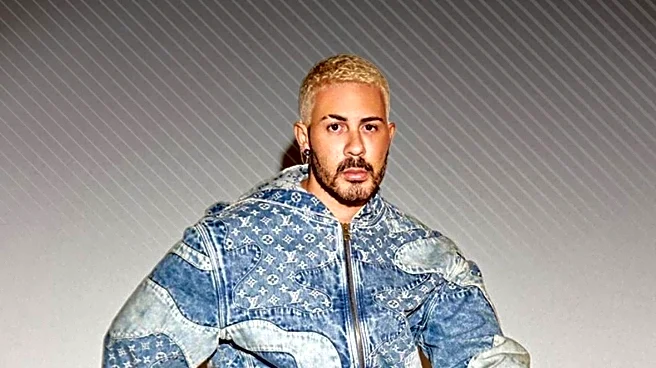What's Happening?
Becca Bloom, a 25-year-old fashion influencer known as 'RichToker,' has come under fire for showcasing a lavish Hermes shopping spree on social media. Bloom, who comes from a wealthy background with billionaire parents in tech and real estate, posted a video on September 13 displaying a collection of high-end garments from the French luxury brand Hermes. The video, which features Bloom surrounded by the brand's signature orange packaging, has sparked criticism from both fans and fellow influencers. Critics have pointed out the stark contrast between Bloom's extravagant spending and the financial struggles faced by many of her followers. One influencer, using the handle 1ilyp00h, criticized Bloom for her apparent lack of philanthropy, noting that her only known charitable act was through a paid partnership. Despite the backlash, Bloom has amassed a significant following, with 4.7 million followers since her first TikTok post in January 2025.
Why It's Important?
The criticism of Becca Bloom highlights the growing scrutiny faced by social media influencers who flaunt their wealth, especially in a time of economic disparity. This incident underscores the tension between the portrayal of luxury lifestyles online and the realities of financial inequality. Influencers like Bloom, who display their wealth without apparent regard for broader societal issues, risk alienating their audience and facing backlash. The situation also raises questions about the responsibilities of influencers in using their platforms for positive impact, such as promoting charitable causes or raising awareness about social issues. As the influencer economy continues to grow, the ethical considerations of wealth display and consumerism are becoming increasingly significant.
What's Next?
The ongoing debate about influencer responsibility and wealth display is likely to continue, with potential implications for how influencers engage with their audiences. Brands may also reconsider their partnerships with influencers who face public criticism, as they seek to align with values that resonate with consumers. Additionally, there may be increased pressure on influencers to demonstrate social responsibility and contribute to charitable causes. The response from Bloom and her management team, if any, could influence public perception and her future in the influencer industry.
Beyond the Headlines
This incident reflects broader cultural shifts in how wealth and privilege are perceived in the digital age. The rise of social media has democratized fame, allowing individuals like Bloom to gain significant influence. However, it also exposes them to public scrutiny and demands for accountability. The backlash against Bloom may signal a growing demand for authenticity and social consciousness among influencers, as audiences become more critical of content that appears out of touch with societal realities.








